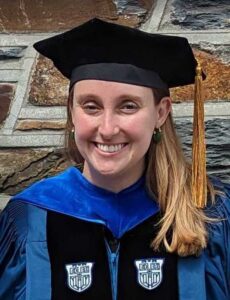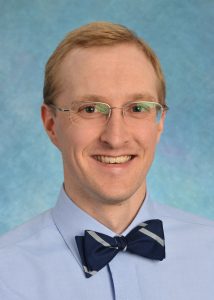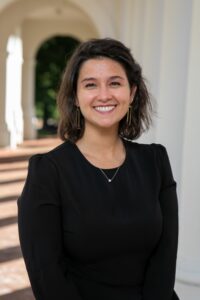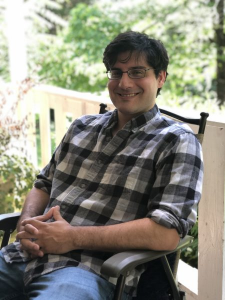Our Trainees
 Jihad Aljabban, MD
Jihad Aljabban, MD
Mentor: Shehzad Sheikh
Topic of T32 Research Project: Biochemical pathways that influence myofibroblast activity in fibrostenotic and penetrating disease.
JIhad is a gastroenterology fellow investigating intestinal fibrosis in Crohn’s Disease. Through metabolomic analysis, I will elucidate the biochemical pathways that influence myofibroblast activity in fibrostenotic and penetrating disease with intent to develop new treatments for this phenotype.” When not in the lab Jihad likes to go biking, play indoor soccer and travel.
Anna Salvador, RD, PhD
Mentor: Shehzad Sheikh, Aadra Bhatt
Topic of T32 Research Project: Role of the diet in the etiology of inflammatory bowel diseases
The role of diet in the in the etiology of inflammatory bowel disease remains unresolved. I am a dietitian-scientist with an interest in dietary antigens contributing to inflammatory bowel disease pathogenesis in genetically susceptible individuals. My hobbies include running, bouldering, and kayaking.
Courtney Rivet-Noor, PhD
Mentor: John Rawls
Topic of T32 Research Project: The role of HNF4a in transcriptional regulation of intestinal programs in inflammatory disease, viral infection, and microbiome/mucus disruption
Courtney was born and raised in Michigan. She attended the University of Michigan where she studied Neuroscience. After undergrad, Courtney earned her PhD from the University of Virginia in Neuroscience with a focus on Neuroimmunology. In grad school, she studied the role of the microbiome and the mucus layer in stress-induced depression under her mentor, Alban Gaultier. As a post-doctoral scholar in the lab of John Rawls, Courtney will be studying the role of HNF4a in transcriptional regulation of intestinal programs in inflammatory disease, viral infection, and microbiome/mucus disruption. Outside of the lab, Courtney enjoys baking, spending time with her 2 nephews, listening to audio books, and boring her husband with all the known mucin facts.
Valerie  Gartner, PhD
Gartner, PhD
Mentor: Terry Furey
Topic of T32 Research Project: Functional genomics methods to identify molecular characteristics of IBD phenotypes
I received my Bachelor’s degree in Biology from Bryn Mawr College in 2014, then received a Postbaccalaureate Intramural Research Training Award fellowship at the NIH in Bethesda, MD. I completed my PhD training at Duke University in the Genetics and Genomics program in 2022. My thesis work was done in the lab of Greg Wray studying evolutionary genomics of the malaria parasite P. vivax. As a postdoc in Terry Furey’s lab, my goal is to leverage evolutionary signals to better interpret the functional significance of genetic variants associated with Inflammatory Bowel Disease. During my free time I enjoy reading, power lifting, playing video games, and quilting.
Tyle r Culpepper, MD, PhD
r Culpepper, MD, PhD
Mentor: Janell Arthur
Topic of T32 Research Project: Live biotherapeutics for the prevention of inflammation-associated colorectal cancer
I am a microbiologist and internist by training with a background in environmental microbiology, particularly intestinal microbiota. My clinical practice is within the specialty of gastroenterology. In the past, I have functioned as a clinical trials manager/study coordinator (specifically nutritional interventions), a basic scientist in both academia and industry, and a university instructor. Currently, I am in a combined clinical and basic science post doctoral fellowship.
In free time, I enjoy distance running and obstacle courses. Though I rarely make the time to practice, I enjoy playing drums and other percussion instruments. I also enjoy college football (and the tailgating and other get-togethers that surround the season). Previously a four-time Florida Gator, I am now excited to wear a new shade of blue at the University of North Carolina. Go Tar Heels!
 Kendall Lough, PhD
Kendall Lough, PhD
Mentor: Scott Williams
Topic of T32 Research Project: Embryonic development of gut-brain sensory circuits
The goal of Kendall’s postdoctoral work is to uncover the mechanisms guiding the formation and function of gut-brain communication during embryogenesis. Recent evidence suggests that the epithelial sensory network of the intestine synapses with the central nervous system through the vagal nerve, forming a rapid neural circuit capable of translating intestinal contents into sensations of satiety and reward. Kendall’s research seeks to determine when this circuit first forms and thereby uncover the cell and molecular mechanisms underlying its formation. Outside the lab, Kendall enjoys good food, good drinks, playing & watching basketball, and spending summer days at the lake with his wife and his dog, Pasta.
 Simon Gray, MD, PhD
Simon Gray, MD, PhD
Mentor: R. Balfour Sartor, MD
Topic of T32 Research Project: Bacterial functions and community dynamics in intestinal homeostasis and inflammation. Physiologic induction and maintenance of IBD remission with live biotherapeutics
Simon Gray was born in South Africa and grew up in Maryland. He studied Chemical Engineering as an undergraduate at the University of Maryland, Baltimore County and as a Gates-Cambridge Scholar at the University of Cambridge, where his research focused on cell separation technologies. Simon earned his MD/PhD at the Yale School of Medicine in the Department of Immunobiology. His PhD thesis was completed under the mentorship of Dr. Susan Kaech and focused on the epigenetic regulation of CD8+ T cell development. Simon’s research interest is the intersection of the gut microbiome and mucosal immunology in the gastrointestinal tract and liver. He hopes to blend his engineering and bioinformatics backgrounds with expertise in basic wet-bench research during his ongoing research training.
Vivian Lee, MD
Mentor: Ajay Gulati, MD
Topic of T32 Research Project: Investigate the role of the gut microbiome in mucosal inflammation and healing
Vivian recently moved to North Carolina from Chicago. She received her BS in Molecular and Cellular Biology at University of Illinois – Urbana Champaign; her M.Sc. in Molecular Biology and Pathology of Viruses at Imperial College of London; her MS at University of Illinois – Chicago and her MD from Chicago Medical School at Rosalind Franklin University of Medicine & Science United States of America. During her free time she enjoys hiking.
Alfredo Blakely-Ruiz, PhD
Mentors: Manuel Kleiner, PhD and Casey Theriot, PhD
Topic of T32 Research Project: Effect of diet on the metabolic function of gut microbiota
Alfredo’s current research focuses on capturing metabolic changes in the gastrointestinal microbiome due to changes in diet and disease state. To do this, he detects and quantifies thousands of host and microbial proteins in human and mouse fecal samples using mass spectrometry based metaproteomics. Alfredo’s journey to this research started with a bachelor’s degree in biology from the University of Notre Dame. After Notre Dame, he joined the Infectious Diseases Research Institute in Seattle where he worked as part of a team conducting early drug discovery research for tuberculosis. After three years, Alfredo decided to pursue his passion for genome science by joining the Genome Science and Technology PhD program jointly sponsored by the University of Tennessee and Oakridge National Laboratory. There he pursued a PhD under the direction of Dr. Robert Hettich, where he fell in love with gut microbiome research as he integrated genome resolved metagenomics with metaproteomics to infer microbial metabolic function in Crohn’s disease patients, necrotizing enterocolitis patients, and lean and obese mice. After his PhD, Alfredo joined the lab of Dr. Manuel Kleiner at NCSU, where he is currently looking at the effects of dietary protein on gut microbiome, while developing methods to directly detect host foraging in the gut microbiome. In 2020, Alfredo was appointed to a three-year term as a young alumnus on the University of Notre Dame science advisory council. When not extracting genomes from metagenomes, Alfredo enjoys chasing around his two kids and reading historical fiction. Hopefully soon, he will get back to his more outdoorsy hobbies of snowboarding and bouldering.

Elaine M. Glenny, PhD
Mentor: Stephen D. Hursting, PhD, MPH; Co-Mentor: Jatin Roper, MD
Topic of T32 Research Project: Identification of adipose-derived metabolites underlying dysregulated colonic epithelial cell function and colon cancer.
Elle Glenny first became interested in gastrointestinal biology and host-microbe interactions as an undergraduate at Cornell University under the mentorship of Drs. Ruth Ley and Omry Koren. She then moved to North Carolina to do her PhD research at the University of North Carolina – Chapel Hill in the Carroll lab within the Department of Nutrition. Under the direction of Drs. Ian Carroll and Laurianne Van Landeghem (North Carolina State University) she investigated the consequences of severe calorie restriction on intestinal stem cell function and potential interactions of the gut microbiota. To further delineate dietary regulation of intestinal epithelial cell function, Elle’s T32 project with Drs. Stephen Hursting and Jatin Roper (Duke University) is investigating adipose-derived inflammatory factors that may drive colorectal tumor progression in obesity. Outside of lab, Elle enjoys the outdoors, traveling, and playing ultimate frisbee.
 Gabriel Suarez, PhD
Gabriel Suarez, PhD
Mentor: R. Balfour Sartor, MD; Co-Mentors: Aadra Bhatt, PhD; Shehzad Sheikh, MD, PhD
Topic of T32 Research Project: Genetic regulation of intestinal bacterial conversion of taurine-conjugated bile acids to hydrogen sulfide.
Gabriel received his BS at Interamerican University of Puerto Rico and his PhD at University of Texas – Austin. He is broadly interested in the characterization of protective and inflammatory mechanisms mediated by bacteria and their metabolites in murine models of inflammatory bowel disease (IBD), to pave the way for novel interventions and treatments applicable to humans. As a trained biotechnologist and molecular biologist, he hopes to bridge the gap between immunology and the young—yet, flourishing—microbiome sciences utilizing state-of-the-art bacterial engineering and synthetic biology tools. Recently, the group has identified metabolism of taurine-conjugated bile acids to hydrogen sulfide (H2S) as having a possible causative role on the onset and aggravating of IBD. To expand on this finding, Gabriel’s current focus is to dissect the genetic pathways by which selected resident enteric bacterial strains, including Clostridium perfringens and Clostridium bolteae, can drive inflammatory mechanisms via their differential bile acid metabolism, how these processes can disrupt normal/healthy gut flora and drive dysbiosis. Gabriel’s love for microbes extends outside the lab and bench, and into his kitchen. He is very passionate about making and enjoying the amazing health benefits of homemade fermented foods, particularly milk kefir and kombucha. He also plays tennis (or ping pong!), a little guitar/piano and loves to be out exploring and interacting with nature.




